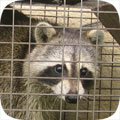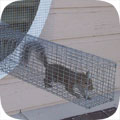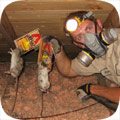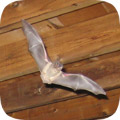- vienna@wildlifeanimalcontrol.com
Call 24/7 for a free quote:
703-939-9551
Vienna Wildlife Animal Control
Professional Wildlife Removal Company Servicing Vienna, VA
If you have a problem with wildlife in your Vienna home, your best option is to hire a company that specializes in Virginia wildlife removal only. This is a specialty business, and regular pest control companies do not use the proper techniques to solve animal problems. I have spent many years reviewing Virginia and Vienna, and I recommend the following:
EnviroGuard Solution
Cell Phone: 703-939-9551
NOTE: If you have a dog or cat problem, call Fairfax County Animal Services: (703) 255-6377

EnviroGuard Solution specializes primarily in removing animals from attics of homes and buildings - this includes squirrels in attics, raccoons, and rats or mice in homes. Virginia also has a documented problem with
bats in buildings, and EnviroGuard Solution is specially trained in bat removal. They also perform general wildlife trapping services, such as the capture and removal of skunks or opossums on the
property. Call 703-939-9551 to discuss your critter problem and schedule a same-day or next-day appointment. Click here to learn more about
what prices we charge in 2024.
When hiring a company to solve your wild animal problem, you want these features:
- Specializes in wildlife removal, not pest control
- Fully Virginia and Fairfax County licensed and insured
- Works 7 days per week (critters don't take weekends off)
- Performs full building inspections: enters and inspects attic
- Performs exclusion repairs, with guarantee against animal re-entry
- Offers cleanup of biohazardous wildlife waste
EnviroGuard Solution is a full-service Vienna wildlife removal company. This is very different from a regular Vienna pest control company. The pest control companies spray poison to kill insects. This is not at all
similar to wildlife removal. EnviroGuard Solution performs a full inspection of the home or property, and determines why the animal(s) are there, and if inside a building, how the animals got inside. All
animals (including rodents) are trapped and removed, or if possible, removed from the building using special exclusion devices. Once the animals are gone, preventative repairs are essential, and
cleanup is sometimes recommended.
 Vienna wildlife trapping - it's not as simple as it may seem. It's illegal in Virginia to trap without a license. Trap type is very important and there are many different types, bait is somewhat relevant, trap placement
is vital, and there are dozens of small things that are very important to know.
Safety is a concern. Then once the animal is trapped, it must be removed and dealt with in the proper manner according to Virginia law. We offer Vienna raccoon removal. Read more about how to get rid of raccoons.
Vienna wildlife trapping - it's not as simple as it may seem. It's illegal in Virginia to trap without a license. Trap type is very important and there are many different types, bait is somewhat relevant, trap placement
is vital, and there are dozens of small things that are very important to know.
Safety is a concern. Then once the animal is trapped, it must be removed and dealt with in the proper manner according to Virginia law. We offer Vienna raccoon removal. Read more about how to get rid of raccoons.
 Animals in attics - this is our specialty at EnviroGuard Solution. Many types of animals like to live in attics. This includes squirrels, raccoons, rats, mice, bats, birds, and even possums. Critters like to go into attics for a safe place to live
and raise their young. Removing animals from attics is very complex work, partly because of the presence of baby animals. If you need Vienna squirrel removal, we can remove all the squirrels from your attic, and seal out any future ones. Read more about how to get rid of squirrels.
Animals in attics - this is our specialty at EnviroGuard Solution. Many types of animals like to live in attics. This includes squirrels, raccoons, rats, mice, bats, birds, and even possums. Critters like to go into attics for a safe place to live
and raise their young. Removing animals from attics is very complex work, partly because of the presence of baby animals. If you need Vienna squirrel removal, we can remove all the squirrels from your attic, and seal out any future ones. Read more about how to get rid of squirrels.
 Rodent control must be done in a very specific way. First off, the most important thing is that all the openings that rats and mice can use to enter a house be sealed. Then all the rodents must be physically trapped and removed.
Never, ever use poison! Most Vienna exterminators will just use this lazy poison technique to kill rodents, and it causes more harm than good - dead stinky rats, and it doesn't solve the problem. Call us for correct Vienna rat removal. Read more about how to get rid of rats.
Rodent control must be done in a very specific way. First off, the most important thing is that all the openings that rats and mice can use to enter a house be sealed. Then all the rodents must be physically trapped and removed.
Never, ever use poison! Most Vienna exterminators will just use this lazy poison technique to kill rodents, and it causes more harm than good - dead stinky rats, and it doesn't solve the problem. Call us for correct Vienna rat removal. Read more about how to get rid of rats.
 Bat removal is a highly specialized task. Virginia is known to have colonizing bats who often live in buildings. Bats love attics. If not removed, the colony can grow to a very large size over the years. The bat droppings are often corrosive and
cause health risks. The same goes for bird droppings on or in buildings. We perform Vienna pigeon removal and bird control. But our specialty is Vienna bat removal. We remove 100% of the bat colony and seal the building so that it's totally bat-proof. Read more about how to get rid of bats.
Bat removal is a highly specialized task. Virginia is known to have colonizing bats who often live in buildings. Bats love attics. If not removed, the colony can grow to a very large size over the years. The bat droppings are often corrosive and
cause health risks. The same goes for bird droppings on or in buildings. We perform Vienna pigeon removal and bird control. But our specialty is Vienna bat removal. We remove 100% of the bat colony and seal the building so that it's totally bat-proof. Read more about how to get rid of bats.
 If you have animals inside a house, no job is complete without proper exclusion repairs. If you simply hire a Vienna trapper who only removes the critters, then the problem will return. You need to hire a Vienna wildlife control company that identifies 100% of the animal entry points
into your building, and seals them shut with professional repairs. In addition, in many cases animals have left waste or contamination behind, and you'll want a company that can provide professional cleaning services. EnviroGuard Solution does both.
If you have animals inside a house, no job is complete without proper exclusion repairs. If you simply hire a Vienna trapper who only removes the critters, then the problem will return. You need to hire a Vienna wildlife control company that identifies 100% of the animal entry points
into your building, and seals them shut with professional repairs. In addition, in many cases animals have left waste or contamination behind, and you'll want a company that can provide professional cleaning services. EnviroGuard Solution does both.
The above are just some of the services offered by EnviroGuard Solution. We also trap and remove animals that destroy lawns, such as moles, or digging animals. Sometimes animals like opossums will live under buildings, steal pet food, raid garbage cans, etc.
Read about how to get rid of opossums. Skunks commonly live under sheds or decks, and set up a den. We can trap and remove them without them spraying. Read about how to get rid of skunks. EnviroGuard Solution
also provides dead animal removal in Vienna. If you need help with any other wildlife conflict, from a fox, beaver, groundhog, or any other critter, we can solve it. We also do Vienna snake removal - most of the snakes in Virginia are not venomous, but
call us if you want safe removal, or read about how to get rid of snakes in Vienna. And remember, we are a private business, not Fairfax County Animal Control Services, so if you have a dog or cat problem, call the County at (703) 255-6377.
Fairfax County animal services does not handle any wildlife issues.
EnviroGuard Solution
Cell Phone: 703-939-9551
Vienna Pricing Info
Every wildlife removal situation is different, from the species of animals involved, the location of the animal inside a house or outside, the extent of repairs or cleanup, etc. It's impossible to give one-size-fits-all prices. Examples MIGHT include:Small Job: For example, a one-stop job to remove an animal in the yard: $100 on up
Medium Job: For example, getting critters out of your house with minor repairs: $300 on up
Large Job: For example, a project involving many service trips and complex work: $500 on up
Give us a phone call now and tell us about your wildlife issue and we will be able to give you a price estimate over the phone. If you're cool with it, we can schedule a same-day or next-day appointment if you like. Our prices are fair, and a good value because we do the job right, the first time.
Vienna Wildlife Tip #1:
Life cycle of fly on dead carcass
While you may be appalled or a little queasy coming around the carcass of a dead animal, flies find them to be an incredible source for survival. Not only do flies use the carcass as a great source of food, it becomes the perfect location for reproduction as well. You would truly be amazed at how much a dead deer, raccoon, or other animal can help fly to prosper.
While this may be kind of gross to some, it is an important part of the cycle of life. This may make you wonder what exactly is the cycle of life for fly on the dead carcass of an animal?
Why this is important is that forensic scientists often use the lifecycle of the fly as a means to be able to determine when a human being may have died. Again, that may seem a little gross, but the behavior of flies is able to provide a timetable to us that assists in helping to solve crimes. At least, that should give you something interesting to discuss after reading this article.
First of all, it is important to understand that it does not take long for flies to locate a dead animal, even a human being. This usually happens within the first few hours, if not minutes after the death. They are just that in tune with locating the carcass so they can continue the life cycle.
Where the life cycle begins is with the laying of eggs, which can be up to 300 at one time. From the time that the eggs are laid until they hatch takes no more than a day.
When the larva hatch, they begin by feeding off of the fluid that the dead body exudes. They will around the body to find the best source of this fluid, which is why you often see hundreds of these maggots crawling toward a specific location.
It is the moving of the maggot mass that is one of the stages of the life cycle, and occurs in the second stage. This often looks like a mass maggot race, as the larva move in exodus, like they are crossing the Red Sea. This occurs in the second day.
In the third day, there is another mass move, but looks much larger because the maggots are much larger by this point. There is a molt that leads to the pre-pupa, which will take two days.
In the pre-pupa phase, the larva leave from the dead animal and get in the soil around it. They do not feed, but transfer to the pupa, which takes about four days.
The pupa then takes 10 days, where the larva changes from a larval body into an adult fly. The emerging takes that 10 day period, where feeding also does not occur during this time.
Within two days of them reaching adult phase, they are able to begin the life cycle all over again. A fly can begin laying eggs by this point, and is why you can literally see millions of flies around a dead carcass within a couple of month's period of time.
Vienna Wildlife Tip #2:
Virginia Wildlife Information:
Virginia State bird: Northern cardinal
State mammal: Virginia big-eared bat
State fish: Brook trout, striped bass
State insect: Tiger swallowtail butterfly
Virginia is attached to the Chesapeake Bay, and because of this, it has a large coastal plain that extends inland, passing the bay's tributaries and eventually ending at the swelling of rocky foothills. Those foothills spread into the Blue Ridge Mountains, an extension of the Appalachian range. The state has an abundance of carbonated rock which has led to the creation of thousands of cave systems. Ten of those systems are currently open to the public, leaving about 3,990 on private land or currently uncharted. Along with the caves comes a variety of bat species, including the big brown bat, Brazilian free-tailed bat, eastern red bat, evening bat, gray bat, and the hoary bat, to name a few. Caves are the perfect habitat for these animals, which can either migrate or hibernate in the colder months. While Virginia is not prone to particularly harsh winters, the cave systems make a good, temperature-controlled place for hibernation.
Bats, though numerous, are only a small portion of the animal population in Virginia. The state has a number of predators including black bears, bobcats, cougars, and coyotes. This state doesn't have huge issues with the larger predators mainly because of how mountainous and wild the habitat has remained. The coastal plain is much more covered in people's homes, and this is where critters like squirrels and raccoons love to play. Because of the amount of trees in this state, it doesn't take long for a vertical-loving animal to find a way into a house. While raccoons and squirrels are definitely on the list of nuisance animals, they are among a score of others including woodchucks, skunks, porcupines, and opossums.
The state is also perfect for birds, and Virginia has a population of golden eagles, a large avian that tends to live in isolated settings across the globe. Not much research has been done on the golden eagle, and Virginia wildlife authorities hope they can study the growing population and shed some light on the species.
The fresh water feeding into the Chesapeake Bay provides a good ecosystem for amphibians and reptiles, and Virginia has a number of water-loving snakes including the cottonmouth and the common water snake. The state also has glass lizards, a snake-like creature, and the only limbless lizard in the United States.
You can always call EnviroGuard Solution, any time of day, at 703-939-9551, for a price quote for Vienna wildlife control services. I am confident that this is the best choice amongst wildlife removal companies in Vienna, VA.







































